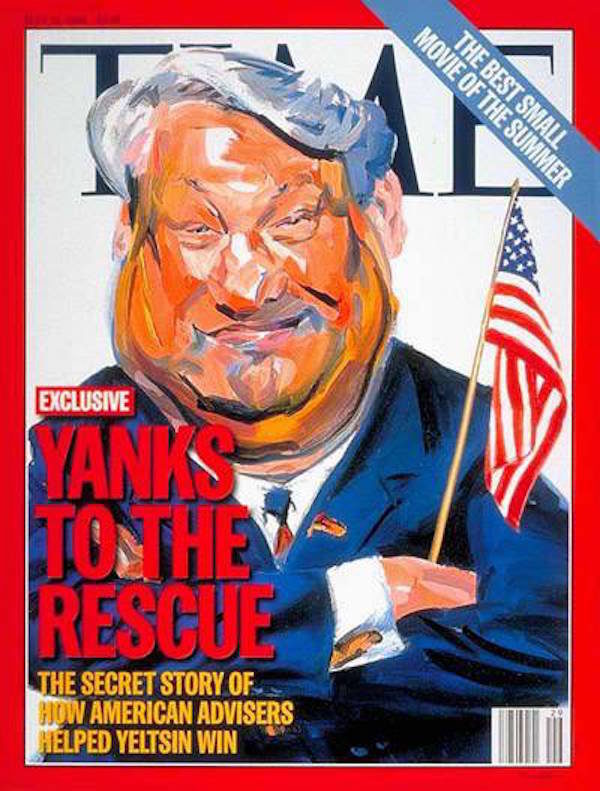https://lemmy.blahaj.zone/comment/2135509
this is practically a child’s view of the world. good guy vs bad guy. Russia = bad, NATO = good. plus, someone should tell her she has it completely backwards: ending russia is kinda natos entire thing
https://lemmy.blahaj.zone/comment/2135509
this is practically a child’s view of the world. good guy vs bad guy. Russia = bad, NATO = good. plus, someone should tell her she has it completely backwards: ending russia is kinda natos entire thing
I agree on all your points except for the existence of Russian imperialism. By Lenin’s definition—correct me if I’m wrong—imperialism is when finance capital is consolidated enough in a given country for that country to begin exporting capital abroad. This might have been the case before the war since so many Russian oligarchs had their billions stashed in western banks, but the contradictions of imperialism itself—its need to grow and consume itself from the inside—now mean that this is no longer the case. Those Russian billions are either frozen or withdrawn as far as I know. Russia’s alignment with China and the BRICS, its long history of fighting for the global south (consider the images we’ve seen for years now of African protestors waving Russian flags), suggest to me that Russia is not actually imperialist and that it is indeed fighting for its life and existence (as it says). Putin is an opportunist appointed by Yeltsin (himself appointed by Clinton!), but opportunism can sometimes point in the right direction because there is no other way for it to survive. (The current president of South Africa is a criminal who likewise deserves our critical support due to his alignment with the BRICS, although none of us are going to be complaining if the EFF takes over next year.) All of us likewise know that a NATO victory in this war will just begin another nightmarish chapter of imperialism in eastern Europe, while a NATO defeat will present opportunities for workers around the world to throw off the American yoke.
they certainly are fighting for their existence. but part of the existence they are fighting for is their status as an imperial power. their ability to partake in imperialism has definitely been diminished by the recent sanctions, but they still hold on to imperialist practices. check their foreign investments. they have certainly been forcibly divested from the western sphere of influence, but they have responded by increasing investments in wealthy eastern countries and the eastern global south
I don’t understand this line of logic, is China imperialist then? A lot of countries invest in other countries.
The post-1971 world is arranged in such a way that every other country is subservient to a single, super-imperialist power that is the US empire.
This condition did not exist in the pre-WWI “multi-polar” order between the European imperialists. Previously, the global imperialist hegemons (e.g. the British Empire) were net creditors to the world, today, the hegemon (the US empire) is a net debtor to the world. It literally just prints dollar out of thin air to control the world. This is the major difference.
Today, the US controls key global financial institutions that dictate the economic policies of the rest of the world.
The US controls the IMF - which uses monetary imperialism to control the fiscal and monetary policies of other countries (the Russian Central Bank, for example, is particularly obedient to the IMF recommendations even to this very day - which is why you see the ruble depreciated, an act that only benefited Western imperialism).
The US dollar comprises 85% of the world’s transaction - the world runs around dollar, like it or not. There is not a single country, not even China, can compete with the US on financial capital.
Russia’s finance capital is a drop in the bucket in a sea of global capital dominated by the dollar. If you look at what the Central Bank of Russia is doing, it is literally helping the US with its monetary policies (rate hikes, ruble depreciation) and a direct antagonism Putin’s nationalist policy that focuses more on the real sector (industrial capital).
The US controls the World Bank - which controls the agricultural policy of the developing world and forced them to invest in export crops that can be sold cheap to Western consumers, rather than food for self-sufficiency. If you do not obey their policies you can be cut off from importing essential goods (like energy).
The US controls the WTO - which controls the trade policy (and thereby the economic and industrial policy) of the developing world, forcing countries to lower the wages of their labor in order to become competitive exporters and allowing Western capitalists to enter their market for exploitation.
Russia does not and will never have control of these global financial institutions. In fact, the goal for Russia is dedollarization, which means to weaken the hold of the financial institutions on to their own country and the world, such that they can take actually a breath after being choked by neoliberalism for almost half a century.
Even if they have the ambitions, Russia has to realize that there is no way to become an imperialist power even after they succeed in dedollarization (and that’s a big IF). Nobody can really afford to get rid of the dollar, and in order to convince them, you actually have to offer real, tangible benefits - and this means the Global South will have a lot to say in shaping new multi-polar order. Russia cannot survive the sanctions without deepening cooperation with the Global South, and in this process, the rest of the world will ensure that not a single country can exert their imperialistic ambitions like the US does today.
great comment and very solid points! i concede that calling Russia imperialist is arguable, but as western hegemony has been faltering in the past couple decades, Russian capitalists have picked up a lot of slack (see their relationship with Syria and Turkey; its hard to argue that their support goes beyond expanding the foreign interests of Russian capitalists). and surely you see the problem with comparing foreign investment of Russia vs China. Russian investments are privately held and aim to produce profit. investments from China are a mix of public and private, and they are demonstrably focused on mutual prosperity
Can you provide sources? The share of SOE in Russia in terms of market cap and % of GDP are variously estimated at ~30%, which is already higher than most countries and only comparatively lower than China’s.
Having said that, yes there is a lot of corruption in SOEs and that includes in both Russia and China.
sorry, i was talking to family. this is a great discussion tho!
SOEs is another topic. it’s a good sign that Russia still has plenty of these, but the state is still under the control of capitalists. and as a capitalist state Russian foreign investment is in practice imperialism via unequal exchange. Russian private foreign direct investment was worth $385 billion in Q2 of 2020. while the Russia’s sovereign wealth fund is valued at $10 billion
additionally, as a bourgeois state, Russian “public” foreign investments operate to carry out the will of Russian capitalists
of course these pale in comparison to amerika’s private FDI of over $5 trillion! there is no doubt the west’s empire is a greater threat to the workers of the world than Russia. and thats why i maintain critical support of Russia
The values there seem to be from before the war? They were investing mostly in the Cayman Islands (lol), and my guess is that that money has either been withdrawn or stolen at this point, although I honestly don’t know.
there are enough values updated during the war to draw some conclusions. yeah, the money moves around so much its impossible to know the extent of how this affects Russian capitalists. this recent hit to Russian capital is great tho, increases the chance of revolution to take hold there
For context, were you alive and politically aware in 1991?
Can you please explain how you think Bill Clinton appointed Yeltsin? Or are you playing with words and just referring to cooperation between the Clinton administration and Yeltsin’s?
The USA was attempting to destroy the USSR from day one, and even invaded Russia (unprovoked) within months of the October Revolution. Yeltsin would have lost the ‘96 election to the communists without Clinton’s direct intervention. When you combine this with the USA’s relentless obsession with funding Nazis worldwide to destroy communism both within and without the USSR, it becomes quite clear that the situation with Russia and Ukraine today is a direct consequence of American meddling overseas.
Which is just not taught in American schools by the way
Yes, very mysteriously even the best history teachers in the country seem to have trouble finding the time to mention this. I took APUSH five days a week an hour a day (or so?) for a year and it was never brought up. Curious! It’s almost as though the USA looks like the bad guy throughout the 20th century and into the 21st when this fact is mentioned. It also completely recontextualizes the Cold War. Very concerning!
I didn’t know any of that. Naturally I go reading to learn more and find this laughable article.
lol
Anyone happen to have a non-lib source to read about this?
Everything I know about Graves has me screaming at that
This seems so weird. Funding Nazis? What do you mean by that?
The Nazis were funded with American capital. There are many, many other examples of this from around the world. The Batista regime in Cuba, the Contras, the US-backed fascists who built South Korea or Taiwan, the list just goes on and on. I will cite sources at your request, but I would ask you to do a simple google search—i.e., “was Park Chung Hee a fascist?”—and a little reading before doing so.
You could baby bird that shit right into their mouths and they probably still wouldn’t get it.
I dunno ask Time magazine
Found the article. No mention of appointments anywhere. :(
“@confusedbytheBasics”
https://journals.uair.arizona.edu/index.php/UAHISTJRNL/article/view/23567/0